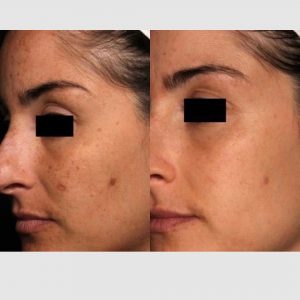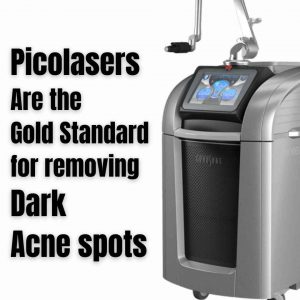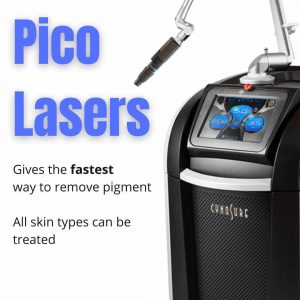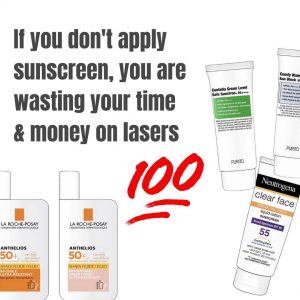Acne Scars Hyperpigmentation At A Glance
- Best Results3-10 sessions
- Treatment RecoveryImmediate
- Procedure Time10-20 minutes
- Skin SpecialistNurse, dermal therapist
- Duration of ResultsLong lasting
- AnaestheticNil to numbing
- Back to WorkImmediately
- Cost$
Acne Scars Hyperpigmentation
Skin darkening can be due to many causes including melasma, sun damage & acne. Hyperpigmentation refers to a condition in which patches of skin become darker in color than the normal surrounding skin. Lasers, peels & good quality skin care, including sun protection, can prevent & treat post-inflammatory hyperpigmentation.
FactsFacts on Acne Scars Hyperpigmentation
- Ethnic skin types are more prone to hyperpigmentation
- The most common cause of hyperpigmentation is chronic acne
- Pigmentation is frequently seen secondary to peels, lasers & waxing
- Lasers & chemical peels can also improve pigmentation
- Precise skin care including regular use of sunscreen forms the foundation of treatment
- The pigment can last up to five years
What causes Acne Scars Hyperpigmentation?
Skin conditions that irritate & inflame your skin can cause hyperpigmentation. Inflammation stimulates the pigment producing cells, known as melanocytes. This causes production of melanin which accounts for the dark colour of skin, known as post inflammatory hyperpigmentation or PIH for short.
How long will it take pigmentation to go away?
This depends on many factors including your ethnicity, sun exposure & degree of inflammation. For lighter skin individuals, brown pigmentation usually takes 3 months to fade. For ethnic skin, pigmentation can last up to five years. PIH acne scarring is mostly due to mild to moderate acne & not due to cystic acne.

What are the best treatments for pigmentation?
Treating pigmentation involves, prevention, protection & correction.
Prevention: essential step as this breaks the cycle. This applies to all cases of pigmentation including acne.
Protection: involves sunscreen selection & proper use.
Correction: involves the application of a lasers &/or a peel program coupled with precision skin care. For brown hyperpigmentation my go to lasers are nano over pico. Why? Nano lasers are far safer than pico lasers, additionally they provide a cost effective solution for the patient. Laser work by decreasing melanin (pigment) production in addition to removing excess pigmentation in the dermal layers. Chemical peels work by chemically exfoliating excess colour in the epidermis, or top layer of skin.
Precise, effective skin care forms the cornerstone of hyperpigmentation treatments. I formulate a program consisting of a combination of retinol, retinoic acid, pigment correctors, botanicals & skin acids, depending on the type of pigmentation & patient factors including skin sensitivities.

How can I fade dark spots from acne, fast (at home)?
Sensible natural remedies include creams that inhibit tyrosinase & prevent oxidation. Ingredients include arbutin, licorice, bearberry, cranberry, kojic acid, ascorbic, citric, lactic, & azelaic acids. The actual formulation of these ingredients to a cosmetically elegant, safe & effective cream is beyond my expertise as a dermatologist. Over the counter brand names are mentioned on my Instagram account @drdavinlim

View our Treatment Gallery
How do I fade PIH from acne?
At Clinic Dermatology we have many lasers that can address acne & acne associated PIH. Generally I prefer lasers over peels because they fade spots faster & are inherently safer.

Q switch lasers including Nano Spectra are good entry level lasers. I also use pico lasers as they remodel early scars & fade pigmentation. For resistant cases I also employ fractional lasers including Fraxel & LaseMD Ultra.
For red acne scars, I use either VBeam, Prima & Perfecta, BBL, IPL or in some cases Laser Genesis.
For an understanding of what is the best laser for your pigmentation, book an appointment with my nursing staff @cutisdermatology
When do I employ chemical peels for acne hyperpigmentation?
I do use peels such as salicylic, lactic & retinoic acids. These are indicated to treat both active acne & acne hyperpigmentation.
PIH or post inflammatory inflammation treated with pico laser. 3 sessions over 3 months using the 1064 Zoom of Picoway
.
👩🏽PIH/Grade 1 acne scars: 50% last 12 months or longer, of those 25% last 5 years. More prevalent in darker or ethnic skin types
.
🧴Topicals: give modest improvements; the usual HQ, arbutin, #cysteamine, licorice root extracts, botanicals ascorbic acid
.
🔫Pico lasers: are the game changer. Above all things, control or eliminate the source of inflammation. In the context of acne, aim for absolute control & remission
.
🎬Action: For PIH scars, book in with the nursing staff at Cutis Dermatology, if you have active acne, consult my dermatology colleagues
.
😎Davin Lim
Dermatologist
Brisbane🇦🇺
#acne #scars #pih #postinflammatorypigment #picolaser #picoway #picolasertreatment #skinlightening #skinbrightening #drdavinlim #brisbanedermatology
Skin Type 5, PIH still evident at 3 months
.
👉Scar type: mixed deep box car, rolling, pick, ice-pick, atrophic. Skin type rate limiting factor
.
🔎Solution: I still employed erbium fully ablative, followed by CO2 fractional. The patient had the understanding that PIH is inevitable if I am chasing scars. PIH treated by my nurses with Picoway. Will take another 3 mtns to resolve
.
👊🏻Concept: Trade scars for PIH 2-8 months. No trade, means taking 4-5 times longer to finish the job💯
.
😎Davin Lim
Dermatologist
Brisbane🇦🇺
.
#scars #scarrevision #acnescars #scartreatement #davinlim #dermatology
#nomorescars #co2laser #laserresurfacing
PIH secondary to erbium laser, treated with Picoway 1064 full beam 6 mm spot,
0.9 to 1.2 fluence by Alison @cliniccutis 3 sessions. If you are used to treating PIH, you know that pico is a game changer… Fear No Pigment 👊🏻
.
🔫Pico: Is awesome for post inflammatory hyperpigmentation from all causes including acne (grade 1 macular scars) through to iatrogenic pigmentation from peels, surgery or lasers. Pico laser, especially in the 1064 wavelength gives predictable treatments in 1-3 sessions. The best bit is that you don’t need to go hard to improve it
.
😎Davin Lim
@candelamedicalanz
Brisbane,
🇦🇺
.
#picoway #picolasser #melasma #pigmentation #laserrejuvenation #davinlim #dermatologist #picotoning #pigmentationtreatments #skinlightening
I cringe at the words ‘natural’ & ‘organic’. Guilty of throwing them around to get the job done. Hydroquinone is one of the best pigment correctors, however there are 3 main (proven) problems with it.
.
1️⃣Firstly it can be irritating to some, even in low concentrations. Hence why I prefer a stand alone as I can titrate
.
2️⃣It is not widely available in Asia, Africa & some European countries
.
3️⃣Long term use can lead to tachyphylaxis & exogenous ochronosis
.
🍊Natural’ pigment inhibitors are useful during the off phase of HQ, as part of rotational therapy, or adjunct in the am. An example is L-ascorbic acid in am which functions as an antioxidant & as a tyrosinase inhibitor
.
👉There are many novel ‘natural’ pigment inhibitor formulations including #Meladerm, #Melarase, #Melacream. Botanicals (technically lab made in some) such as liquorice root, citric acid, #arbutin, azelaic acid, kojic acid & bearberries are the main ingredients in these anti-pigment formulations
.
👍🏻Melasma patients: Be guided by the nurse I have assigned to your case. They will guide you as to how to titrate your topicals & when to integrate non-HQ ‘organic’ topicals into your routine. Rotate & titrate as per their instructions. Your actual program will depend on what stage you are at in your treatment program
.
.
😎Davin Lim
Dermatologist
Brisbane, Australia🇦🇺
.
#dermatologist #melasma #skinlighening #skinbrightening #pigmentationtreatment #skincare #organicskincare #naturalskincare
What skin care is best to treat pigmentation?
There are many skin care ‘actives’ that can treat pigmentation. These include-
- Ascorbic acid or vitamin C as this inhibits pigment & reduces UV induced oxidation
- AHAs such as Glycolic or Lactic Acid. These exfoliate skin cells
- Retinol is a vitamin A derivative & works by inhibiting pigment & increasing exfoliation
- Arbutin is a naturally occurring pigment inhibitor
- Licorice root extract is a common skin care ingredient that inhibits pigmentation
- Bearberry & botanicals are natural ingredients to fade brown spots
- Kojic acid & citric acid can lighten skin

The correct formulation will depend on your skin type & sensitivities as well as your current skin care routine.
How do I manage red hyperpigmentation or ‘macular erythema’?
This form of pigmentation is called macular erythema or PIE or post inflammatory erythema (meaning red). Fortunately PIE is much easier to manage compared to brown. The use of vascular lasers can reduce redness fast with virtually no side effects. Most patients will benefit from 2-4 sessions spaced 2-4 weeks apart. To see if this treatment is for you, book in with my clinical nurses @cutisdermatology
Can acne cause hyperpigmentation scarring?
Acne is the number one cause of hyperpigmentation. Grade 1 acne scars are defined as skin colour changes associated with pimples. This can be brown, known as PIH (post inflammatory hyperpigmentation) or PIE (post inflammatory erythema).
46% of PIH from acne last 12 months, whilst 25% can last up to five years. The majority of PIH from acne comes from mild to moderate zits, pimples, blackheads & whiteheads. Acne cysts only account for a minority of PIH. What does this imply? Basically mild to moderate acne can leave skin colour changes that last a long, long time. The aim of treating hyperpigmentation is mitigation or prevention of pigment. In summary- treat acne early, treat acne effectively, prevent acne lesions from recurring.

sunscreen properly. This exponentially accelerates pigment removal.
* Please note, I am a procedural dermatologist & I do NOT treat acne. My focus is on acne scarring. If you do have active acne, my colleagues @cutis_dermatology can assist.
How do I approach acne scarring in darker skin types?
Acne scarring can be treated just as effectively in darker skin types compared to Caucasian patients. There are however key differences, but the end goal is the same.
- Firstly PIH or skin pigmentation changes are universally seen in darker skin patients. This is 100% certain, however will fade with prescription creams and sunscreen.
- Secondly treatments with lasers can be just as powerful, but the ‘overlaps’ are less. Laser treatments must be conservative.
- To reduce the chances of skin lightening, I usually perform an extra one or two TCA CROSS treatments prior to full laser resurfacing.
- For laser resurfacing, I use both erbium or the CO2 laser, albeit gentler settings
For an understanding of what is your ideal peel, book a consult with my clinical team at Cutis Dermatology.
Acne scars in Asian and ethnic skin types can be treated with Fraxel or Fractional lasers. 3-4 fractional laser treatments are needed for best results. The same applies to Pico lasers.

Who to see for pigmentation treatment?
My dermal therapists & nurses can diagnose & manage most forms of pigmentation, including melasma, actinic pigmentation (sun damage, sun spots), as well as post inflammatory hyperpigmentation. We employ over 50 different lasers, energy devices & chemical peels to individualize treatments according to your skin type & cause of pigmentation.

Davin’s Take on Pigmentation Treatments
PIH or post inflammatory is one of the most common conditions treated @cutis_dermatology. By far the most frequent cause is acne. Other causes include chicken pox, melasma and treatments gone wrong, most frequently IPL, laser, peels, at home melasma treatments, & waxing.

Treatments are aimed at mitigation of PIH, this means the earlier effective prevention treatments are initiated, the more successful the treatments & the outcome. For some cases, working with a medical dermatologist will give you better long lasting outcomes than just treating the signs of pigmentation.

